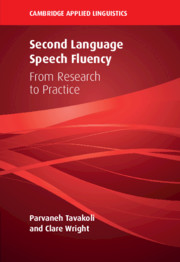Book contents
- Second Language Speech Fluency
- The Cambridge Applied Linguistics Series
- Second Language Speech Fluency
- Copyright page
- Dedication
- Contents
- Figures
- Tables
- 1 Introduction
- 2 Fluency from a Psycholinguistic Perspective
- 3 Measuring Fluency
- 4 Fluency in Second Language Task-Based Research
- 5 Fluency in Second Language Pedagogy
- 6 Fluency in Second Language Testing
- 7 Fluency in Different Contexts
- 8 Conclusion
- Appendix: Fluency Descriptors across Time
- References
- Author Index
- Subject Index
7 - Fluency in Different Contexts
Published online by Cambridge University Press: 15 December 2020
- Second Language Speech Fluency
- The Cambridge Applied Linguistics Series
- Second Language Speech Fluency
- Copyright page
- Dedication
- Contents
- Figures
- Tables
- 1 Introduction
- 2 Fluency from a Psycholinguistic Perspective
- 3 Measuring Fluency
- 4 Fluency in Second Language Task-Based Research
- 5 Fluency in Second Language Pedagogy
- 6 Fluency in Second Language Testing
- 7 Fluency in Different Contexts
- 8 Conclusion
- Appendix: Fluency Descriptors across Time
- References
- Author Index
- Subject Index
Summary
This chapter’s main focus is on fluency research ‘in the wild’, particularly looking at the challenges of developing fluency during immersion in the target language setting, e.g. during Study Abroad. The chapter includes the need for research and practice to move away from standard monolingual native speaker norms, towards use of L2 or multilingual raters as reference norms for evaluating fluency development. We refer to cross-linguistic work on fluency in languages other than English, to see how learners’ and teachers’ expectations can be more realistically framed to fit social contexts and task demands. We include evidence from learner corpora across a variety of languages, which could help develop more robust cross-linguistic theories, methods and evidence of fluency development from a wider multilingual interactional perspective. The final section explores these themes in the context of fluency development through residence abroad, even over short periods such as Study Abroad; evidence is presented from a recent case study of learners of Mandarin Chinese within a more nuanced view of specific task constraints, to highlight the varied nature of fluency development.
Keywords
- Type
- Chapter
- Information
- Second Language Speech FluencyFrom Research to Practice, pp. 124 - 145Publisher: Cambridge University PressPrint publication year: 2020



